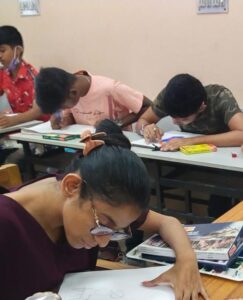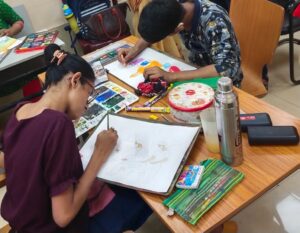Deaf students’ exam success points the way forward for academic support
By Joanna Clark, Director, Deaf Child Worldwide
A stunning breakthrough
I’d like to talk to you about a stunning success made by some of our partner organisations in India.
A significant number of the deaf teenagers they have been supporting have passed their board exams, which determines if and where the student will continue to study after secondary school.
In West Bengal, the Child In Need Institute (CINI) has mentored 19 students to pass their board exams, with one student receiving an A. The Graham Bell Centre for the Deaf told us 17 of its deaf students had passed the exam. In Karnataka, our partner SAMUHA reported that 10 of its deaf students had also passed.
Such was the impact of this breakthrough that Shampa Nath, the Head of South Asia for Deaf Child Worldwide was moved to say: ”There was a time, not so long ago, when the idea of a deaf child in one of these communities ever completing school would have been unimaginable.”
The role of learning centres
All three of our partners have been working with deaf young people for many years, continually providing accessible education to them via their innovative learning centres. The centres work with school-aged pupils alongside mainstream schools and complement their work, enabling deaf students to keep up academically with their hearing counterparts. They provide accessible lessons, create visual learning materials and ensure interpreters are present at exams.
Integral to the success of the learning centres is the recruitment of Community Resource Group Members – local people with an interest or experience in education who are trained by partner staff in teaching deaf children – to work alongside the specialist partner staff.
Disha and the learning centre
Disha’s story is remarkable, not just because of her academic success as a deaf young person in mainstream education, but also because of the obstacles that stood in the way of her getting there in the first place.
She and her parents come from a very impoverished background. Schooling for Disha may not have been the most obvious or prudent path for the family to take, yet her parents encouraged her to take an academic path and supported her along the way.
This is especially noteworthy since there is a widespread expectation in some strata of Indian society that it is only the boys who pursue academic paths, while the girls remain at home to help with the housework and prepare themselves for marriage. It is testament to the effectiveness of the learning centre model and the determination of their staff that a significant number of the deaf students taking and passing their board exams were girls.
However, as is so often the case for a deaf student in mainstream education, Disha’s school lacks both the resources and the expertise to support her adequately and, as a result, Disha struggles academically. She told us: “I am unable to communicate well with people outside my family. Most people cannot understand me. I find it difficult to understand the lessons of my teacher as well.”
This is why learning centres like the one attended by Disha are so vital. CINI was able to step in and support Disha, both academically and in other ways. She told us: “I receive help from CINI in my studies. CINI helps me through sign language. Life skill training is available at CINI as well. I like having study lessons with other deaf friends.”
Thanks in no small measure to the support she received from CINI, Disha passed her board exam with flying colours, receiving an A. She said: “When I got my results I was so happy. My parents, family members, everyone was happy for me.” Now Disha wants to go on to college or university and dreams of becoming a lawyer.
Continuity is key
The success of so many deaf students of both genders in their board exams – something which until very recently would probably have been unthinkable – is yet more evidence of the effectiveness of learning centres in securing good outcomes for deaf young people in mainstream education.
But integral to this effectiveness is the key issue of continuity, as evidenced by this cohort of students itself. They were the first group of teenagers who have had this specialist support in their teenage years. Many of them also benefitted from the support of the learning centres from an early age, enabling them to develop vital language and communication skills.
This support continued through pre-primary and primary school, helping them develop the skills and confidence to attend and prosper at secondary school and beyond. For example, Disha was provided with specialist support at primary school before she moved on to CINI at the age of 12.
Long-term investment will see further successes
The deaf students’ results add to a growing body of evidence supporting the key role that properly resourced learning centres play in helping them achieve good academic outcomes in mainstream education. Long-term investment in learning centres with specially trained educators that intervene as early as possible will see further successes like Disha and her contemporaries.
‘‘Without this support, it is likely that many promising deaf students would simply have dropped out of school. Instead, we now have a situation in which Disha can become an A student,’’ says Shampa Nath. ‘‘Her success also shows that deaf girls can do anything they set their minds to, when they and their families are given the right support.’’”

Disha Participated in Drawing Competion towards observing International week of the deaf 2022

Disha is drawing in a competition during International week of the deaf in 2022

Disha in her only room, where she lives with her parents
About Joanna Clark, Director, Deaf Child Worldwide
“From managing the healthcare response to the Afghan refugee crisis in Pakistan in the 1990s, to being Save the Children’s Country Director in Vietnam for 5 years, Joanna Clark is an international development expert who specializes in children’s health and education.
Joanna has been the Director of Deaf Child Worldwide, the international arm of the National Deaf Children’s Society, since 2013. She leads a team that works across East Africa and South Asia to ensure that the barriers that prevent deaf children from succeeding in life are broken down.
Joanna is passionate about making sure that disabled children in the developing world get the support they need, and that their rights are firmly on the political agenda. ”
About Deaf Child Worldwide
“Deaf Child Worldwide (DCW), the international arm of the National Deaf Children’s Society, is the UK’s leading international charity for deaf children in developing countries. DCW works with partners in developing countries, enabling deaf children and young people to be fully included in their family, education and community life.”



